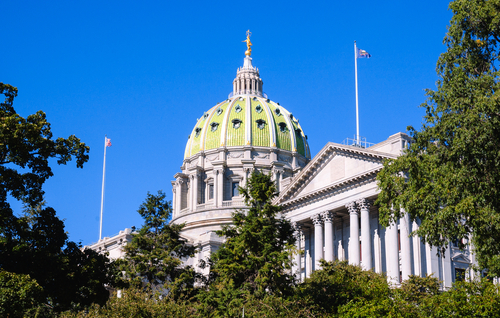
The Pennsylvania House of Representatives approved Tuesday Senate Bill 613 which would require Gov. Tom Wolf to follow federal guidelines in determining which businesses are considered life-sustaining, bringing parity to the Pennsylvania business community.
Surrounding states are already following such federal practices.
Wolf drew criticism, particularly from state Republican leaders and the business community, last month when he ordered the closure of all “non-essential” businesses in the wake of the nationwide COVID-19 pandemic. Many considered his executive order rash and too vague for the good of Pennsylvania’s economy.
“Ever since Gov. Tom Wolf suddenly and without notice decided to close certain businesses he deemed non-essential in the Commonwealth, there have been inconsistencies in his waiver process that are picking winners and losers in our business community,” House Republican members said in a statement regarding the advancement of Senate Bill 613. “A lot of the losers in this situation are the small businesses that are the backbone of our local economies and communities.”
The legislation, which would amend The Administrative Code of 1929, passed the House with a vote of 107-95. Specifically, the measure would provide for a standardized COVID-19 emergency mitigation plan for businesses.
State Democratic lawmakers fear the allowance of more businesses to open would risk overwhelming Pennsylvania’s healthcare system with potential COVID-19 patients. However, Republican legislators believe the bill would create a more consistent and transparent process in determining which businesses can safely stay open while following federal health guidelines.
“We believe certain businesses can and should operate safely by following social distancing and health guidelines. This would be achieved through an amendment to Senate Bill 613 that would require the governor to follow the most current Essential Critical Infrastructure Workforce advisory list developed by the U.S Department of Homeland Security in determining if businesses are life-sustaining and should be allowed to operate,” the lawmakers wrote. “Several states, including some of those surrounding the Commonwealth, are following the tried and tested federal guidelines during the COVID-19 pandemic. Pennsylvania should do the same. Using these guidelines would put businesses here in the Commonwealth on equal footing so the Wolf administration isn’t selecting which businesses can remain open and which would remain closed.”
In addition to Senate Bill 613, the state House also passed Senate Bill 841, which would extend property tax discount periods for property owners, afford leniency to municipalities issuing late payment fees and penalties, and allow local governments to conduct virtual meetings to continue their work remotely.
“Pennsylvanians are hurting. Many people in our communities are scared. It’s time to provide hope by charting a course that allows citizens to safely and carefully take charge of the situation,” State Reps. Matt Gabler (R-Clearfield/Elk) and Tommy Sankey (R-Clearfield/Cambria) said in a joint statement. “We are not calling for business as usual, but we are advancing solutions that look to the future and enable us to work toward a brighter tomorrow. These bills chart that course, and we urge our Senate colleagues and the governor to quickly advance them for the benefit of all Pennsylvanians.”
Both pieces of legislation await Senate consideration before heading to the governor’s desk.